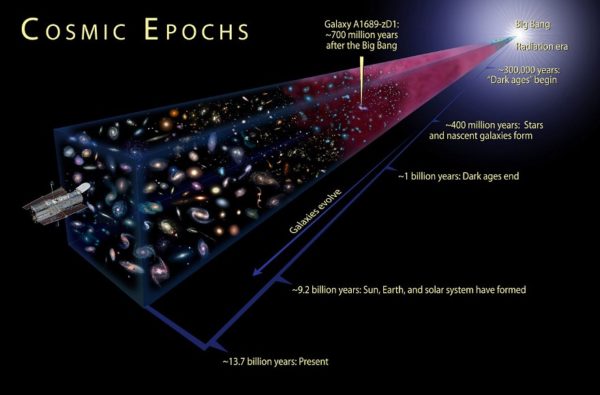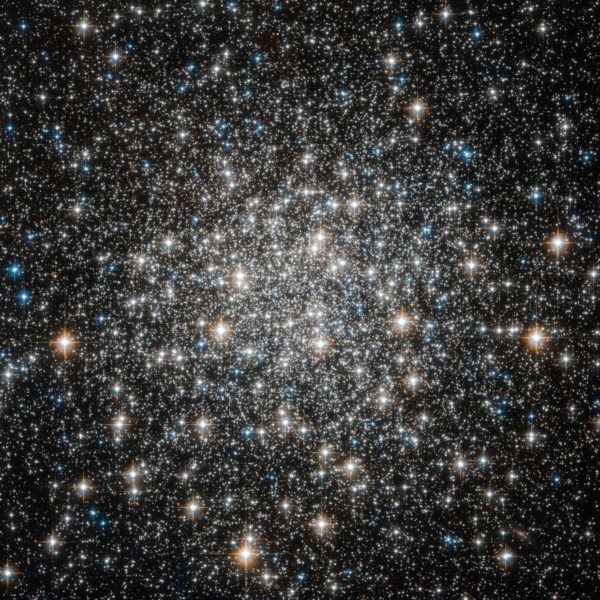"The oldest and strongest emotion of mankind is fear, and the oldest and strongest kind of fear is fear of the unknown." -H.P. Lovecraft
There’s a unique relationship between everything that exists in the Universe today -- the stars and galaxies, the large-scale structure, the leftover glow from the Big Bang, the expansion rate, etc. -- and the amount of time that’s passed since it all began. When it comes to our Universe, there really was a day without a yesterday, but how do we know exactly how much time has passed between then and now?
 The Universe's expansion rate is determined by the various types and percentages of matter and energy present within it. Image credit: NASA, ESA, and A. Feild (STScI).
The Universe's expansion rate is determined by the various types and percentages of matter and energy present within it. Image credit: NASA, ESA, and A. Feild (STScI).
There are two ways: one complex and one simple. The complex way is to determine all the matter and energy components making up the Universe, to measure how the Universe has expanded over the entirety of its cosmic history, and then, in the context of the Big Bang, to deduce how old the Universe must be. The other is to understand stars, measure them, and determine how old the oldest ones are.


Considering the age of the Universe is 13.8 billion years old it makes me appreciate my 5.46 billion year old ''possible'' NWA 7325 Mercury Meteorite, which I bought from here: http://thespacecollective.com/buy-meteorites/mercury-meteorite-nwa-7325. It makes me wonder sometimes if we will ever encounter anything older, an advanced civilization perhaps? 13.8 billion years is a long time to evolve.
@Richard #1: That must be a typo (on their site, not by you). The Solar System has been rather precisely dated, using isotopic rations from CAI's, to 4.5682 Gy (yes, that's five digits of precision). Your putative Mercury meteorite is presumably 4.56 Gy old, not "5.46".
“There are actually two different, independent methods we have to measure this number, and while one is far more accurate to the other, the less precise method involves far fewer ASSUMPTIONS.”
And we know what happens when we make too many assumptions:
https://www.youtube.com/watch?v=LfvTwv5o1Qs
……………………..
Your graph shows that
“Matter: dilutes as the Universe expands”, yet later you say
“Under the laws of General Relativity, if you have a Universe like ours, which is: of uniform density on the largest scales…”
These two statements appear to conflict, don’t they?
@Idiot #2: No, those two statements don't conflict at all. Just because you're too stupid to see it, doesn't make it so.
Um, "we" start desperately making fools out of "ourselves" elsewhere when Breitbump just isn't going for enough frottage? You might as well start filling the "location" field with what you're wearing.
To Mikey the SLACer #4:
So, you’re saying that in the Forbes’ article, under the title “Matter: dilutes as the Universe expands”, the interior of the smallest circle to the left reflects the same matter density as the interior of the largest circle to the right?
You're going hurt yourself running around with those goalposts.
@Idiot #6: If you can't (or won't) understand the difference between "uniform" and "constant", nothing I say can help you. Your stupidity and/or duplicitousness is on display for everyone to see.
Hey, but S.N. said "matter density." He's already had the a(t) hint, so the scaling of its friend can't be far behind.
To Mikey the SLACer #8:
I suppose the real problem is that the universe’s matter is actually NOT dispersed uniformly.
That is, the universe is NOT homogeneous.
And never has been.
P.S.
I hope you’re not a teacher.
Golly gosh, you could hear sn stomping his foot for emphasis all over the internets.
The only question is whether S.N. actually understands that he's arguing for geocentrism. He's been entirely silent on this front despite direct, public inquiries.
"I suppose the real problem is that the universe’s matter is actually NOT dispersed uniformly."
Why is that a problem? Nobody says it is. Astronomers have called some of them names, indicating that non uniformity exists.
"That is, the universe is NOT homogeneous."
The universe WAS homogeneous. To a very high degree.
"“Matter: dilutes as the Universe expands”, yet later you say
“Under the laws of General Relativity, if you have a Universe like ours, which is: of uniform density on the largest scales…”
These two statements appear to conflict, don’t they?"
No.